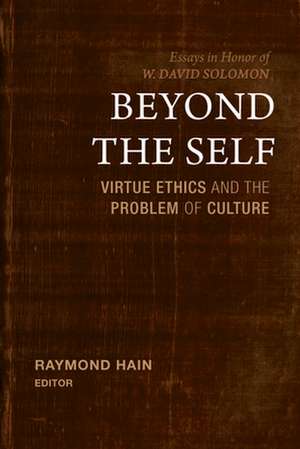Beyond the Self
en Limba Engleză Hardback – 30 iun 2019
Beyond the Self: Virtue Ethics and the Problem of Culture comprises twelve chapters: eleven that employ Solomon's work and legacy, followed by a twelfth concluding chapter by Solomon himself. Each chapter deepens and develops virtue ethics as a rich intellectual tradition rooted in Aristotle and Thomas Aquinas.
Editor Raymond Hain divides the volume into three sections. The first addresses the historical contexts of happiness, justice, and mercy in the tradition of Aristotle and Thomas Aquinas. The second turns to recent themes in normative ethics, focusing on topics such as morality, virtue, and egoism. The third discusses broader ethical issues with significant cultural implications, such as human dignity, physician-assisted suicide, and secularization.
Beyond the Self uncovers the shortcomings of contemporary moral philosophy and the depth and capacity of the Aristotelian and Thomistic traditions, reminding the reader that classical virtue ethics remains the most promising framework for understanding the moral life.
Contributors include: Michael Beaty, Kevin L. Flannery, Raymond Hain, John Haldane, Thomas Hibbs, Irfan Khawaja, Alasdair MacIntyre, John O'Callaghan, Bryan C. Pilkington, W. David Solomon, Christopher Toner, and Candace Vogler.
Preț: 436.04 lei
Nou
Puncte Express: 654
Preț estimativ în valută:
83.44€ • 87.29$ • 69.31£
83.44€ • 87.29$ • 69.31£
Carte tipărită la comandă
Livrare economică 03-17 aprilie
Livrare express 26 februarie-04 martie pentru 54.21 lei
Preluare comenzi: 021 569.72.76
Specificații
ISBN-13: 9781481310413
ISBN-10: 1481310410
Pagini: 296
Dimensiuni: 157 x 235 x 22 mm
Greutate: 0.59 kg
Editura: Baylor University Press
ISBN-10: 1481310410
Pagini: 296
Dimensiuni: 157 x 235 x 22 mm
Greutate: 0.59 kg
Editura: Baylor University Press
Descriere
Uncovers the shortcomings of contemporary moral philosophy and the depth and capacity of the Aristotelian and Thomistic traditions, reminding the reader that classical virtue ethics remains the most promising framework for understanding the moral life.
